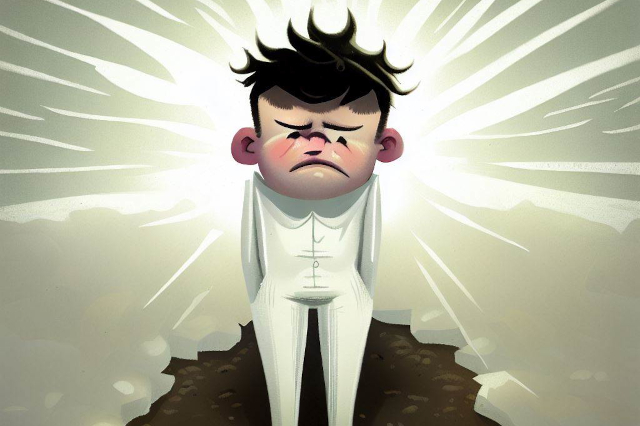
A prison built with our own hands
The battle was fierce, but also short and decisive—despite a huge loss of men and a painful personal wound, Captain Moroni had thrown “one of the greatest of the armies of the Lamanites” into complete disarray. But Moroni “did not delight in bloodshed;” when he saw that his enemies were beaten, he offered them terms of surrender. The Lamanite army accepted his terms, and the prisoners were marched to the land of Bountiful.
There they were put to work: they dug ditches, they piled up dirt, and they built a giant wall around the border of the city. Once the Lamanites had fortified the city, they became its new residents: “in this city [the Nephites] did guard the prisoners of the Lamanites; yea, even within a wall which they had caused them to build with their own hands” (Alma 53:5).
Scriptural ironies of a self-wrought punishment
This description of the Lamanites being imprisoned within “a wall [built] with their own hands” stuck out to me. I realized this pattern of self-made punishment is found throughout scripture:
- The wicked men whose schemes landed Daniel in the lion’s den for the night ended up being permanent residents there themselves.
- The sentence King Noah pronounced on Abinadi was the same method of execution he suffered, himself.
- The evil Seantum spilled the blood of his brother that would condemn him on his cloak.
- The destruction of the house of King David was brought about through the sins he committed.
- The cities of Ammonihah, Sodom, Gomorrah, and the Nephites of 33 AD were initially preserved because of the righteous that were in them. By killing and casting out the righteous from among them, they were throwing away the one thing that was keeping them alive.
- By telling Pilate, “[Christ’s] blood be upon us and our children,” the ancient Jews were rejecting their covenant relationship and inviting the wrath of God upon themselves.
This promise has special relevance to our day. Speaking of how the devil and his supporters will be thwarted in the fulness of times, Nephi prophesied:
That great pit, which hath been digged for [the saints of God], … yea, that great pit which hath been digged for the destruction of men shall be filled by those who digged it, unto their utter destruction…
And the blood of that great and abominable church, which is the whore of all the earth, shall turn upon their own heads; for they shall war among themselves, and the sword of their own hands shall fall upon their own heads, and they shall be drunken with their own blood.
And every nation which shall war against thee, O house of Israel, shall be turned one against another, and they shall fall into the pit which they digged to ensnare the people of the Lord.
Spiritual prisons
I don’t know what the Lamanites’ experience in the prison city of Bountiful was like. But I have seen a little of what modern prisons are like. I had the opportunity on my mission to make a weekly visit to one of Colorado’s prisons and teach one of the inmates there. This experience had a profound impact on me. For one thing, we were excited to have someone who, for once, was guaranteed not to bail on a teaching appointment 😉. But more importantly, those visits introduced me to an entire world I had only read about. Just walking into the lobby of the jail was a spiritual experience, but not necessarily in a good way.
I think the closest comparison I can make is, surprisingly, the Temple. When I visit the House of the Lord, or even just walk on the grounds, I feel an immediate change in the very atmosphere. There is a palpable sense of reverence, of hope, and of the joy promised both here and hereafter. Stepping from the parking lot to the Temple grounds is a shadow of stepping from the Terrestrial world to the Celestial. Each time I leave, the feeling of peace remains for some time afterward.
On the other hand, each week I visited that jail, even just inside the lobby, I felt a similarly immediate change in the atmosphere—a change opposite the atmosphere of the Temple. There is a palpable sense of angst, despair, and the punishments enforced here (and potentially, hereafter). Stepping from the parking lot into the lobby was a shadow of stepping from the Terrestrial world to the Telestial. Each time I left, the feeling of disquiet remained for some time afterward. I can only imagine how that feeling must wear on someone who lives there for months or years at a time.
How much worse, then, our spiritual prisons must be when we realize that we built them, ourselves, brick by brick, and every lost blessing and punishment was dealt us by our own hands. As Samuel the Lamanite warned:
If [we] are condemned [we] bring upon [ourselves] our own condemnation… whosoever perisheth, perisheth unto himself; and whosoever doeth iniquity, doeth it unto himself.
Breaking out
The deliverance we need is not just deliverance from external problems like death and affliction— we need to be delivered from the sufferings we inflict on ourselves. Those Lamanites incarcerated in prisons “built with their own hands” surely considered the “blessed and happy state” of their fellow soldiers from only a few years before. Those Lamanites from the previous war had been offered the chance to go free provided they enter into a covenant of peace. After a few years, they also sought that opportunity. A second chance was granted to them. Although some soldiers had initially rejected the terms of surrender, 100% of the humbled army accepted this covenant of peace. They all joined the Christian converts of Ammon and lived out their lives peacefully with the Nephites.
Like Captain Moroni, Christ is at war. To some extent, He is at war with us— or rather the sin that we harbor within us. That war takes a toll. There is a price to be paid, and there is a prison awaiting us when we fight against Him— one that we are building ourselves brick by brick. Like Moroni, Christ has lost much and was personally wounded by our battles, but He is not out for vengeance. The war for our souls is not over. We still have time to choose freedom. Every day, we are offered the same terms as those Lamanites: make (or renew) a covenant of peace with Him and enjoy the spiritual freedom of the Atonement. Through His grace, Christ breaks down the walls of sin that we build with our own hands every day, and invite us to live with Him in freedom and peace.
NOTE: This is an update to a post originally written in 2017.


